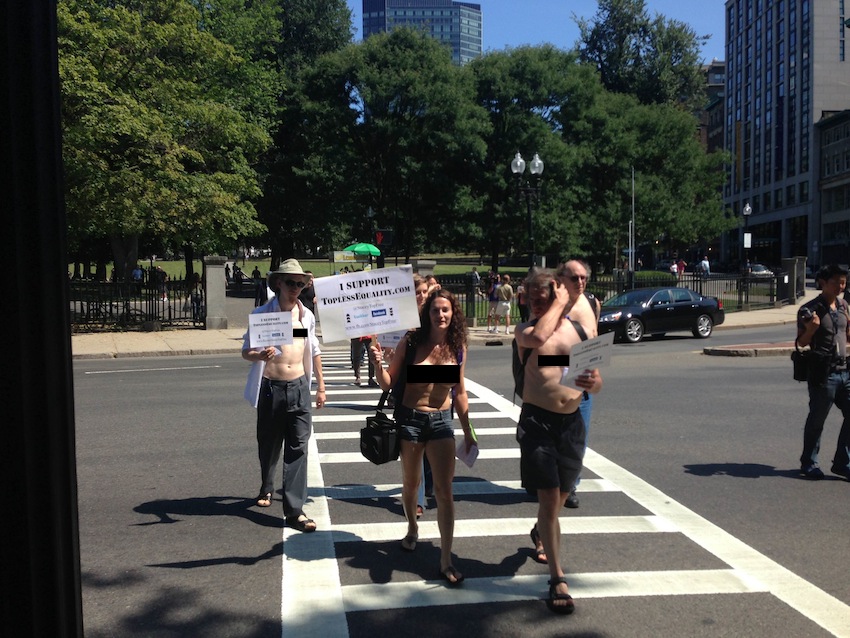‘Bodies Are Bodies’: Group Marches Through Boston For Topless Equality
Some people clapped, others cheered, and a few snickered or pulled out their smartphones to grab a photo.
But almost every single person that a group of half-nude protesters passed on the streets of Boston turned their heads in bewilderment at the site of the bare-breasted individuals taking part in “Go Topless” day.
Stacey, the spokesperson for the Massachusetts chapter of ToplessEquality.com, who didn’t want to use her last name, lead the march that started at the corner of Boylston and Charles Streets on the Boston Common Sunday afternoon, mere steps away from a little league game, and continued on through Beacon Hill, passed the State House, and ended on the steps of City Hall plaza.
With four people beside her, Stacey protested state and local laws that prevent women from taking off their tops, and showing their breasts in public, the way men are allowed to, as part of a national movement held every year a day prior to Women’s Equality Day, which marks the passage of the 19th Amendment in 1920, allowing women to vote. “Everyone’s got nipples,” said Stacey, before the march was underway, as she waited for people to show up. “Women should be allowed to walk around without a shirt on, too.”
ToplessEquality.com, the group Stacey represents, and Go Topless are two separate organizations, but Stacey brought the two together to celebrate the annual day of protest, which is held in hundreds of cities across the country.
As Stacey, one other female, and three men, holding signs for equal rights, walked quietly through the city on a Sunday where the streets were packed with tourists, families, and residents, all enjoying the last of the summer weather, passerby stopped, stared, and started taking photos.
And although most people turned their heads to gawk—one mother covered her children’s eyes— at the five protesters, no one really seemed to mind for the most part. “My breasts are as big as hers,” said Todd Cooper, one of the protesters, pointing to Stacey’s chest. “I don’t see the problem. If a man can have his shirt off, women should be able to as well.”
Under state law, which deems “uncovered or less than opaquely covered human genitals, pubic areas, [and] the human female breast below a point immediately above the top of the areola” illegal, the female participants risked arrest. But no police approached the marchers for the duration of their event, and one even pulled up alongside the group, looked over briefly, and drove away.
Neither the police, nor many people they walked by seemed to let the laws interfere with the skin-showing stroll. “I’m fine with it. I believe if they want to feel comfortable with their shirts off, then why not? Equal rights, right? I don’t think it’s something that will transition easily into [everyday society] but maybe it’ll be something that happens in the future,” said Susan Ruder, as she walked by the group on Charles Street.
Drivers honked their car horns, and people cheered from onboard the Duck Boats that drove around Boston Common, with some making quacking sounds from the tourist vehicles.
Daniel Green, of Boston, gave Stacey and her followers a thumbs up. “What’s fair is fair. And I think this is pretty fair, for me,” he said. “I think people are just uptight. I have nipples and I can show them. Why can’t they?”
Once at City Hall, where the march ended, and the group continued to hand out pamphlets to curious bystanders that wanted to know what the nudity was all about, interest picked up a little more, and others almost spontaneously disrobed in a show of support.
Ashley Malans and her friend Sophia Quazi didn’t participate, but they did take pamphlets and admit they would sign a petition to help forward the movement. “Honestly, it’s the same exact anatomy as a male’s body, except when you add a little fat and it suddenly becomes offensive and sexualized,” said Malans. “I think [topless equality] is definitely something people should support.”





